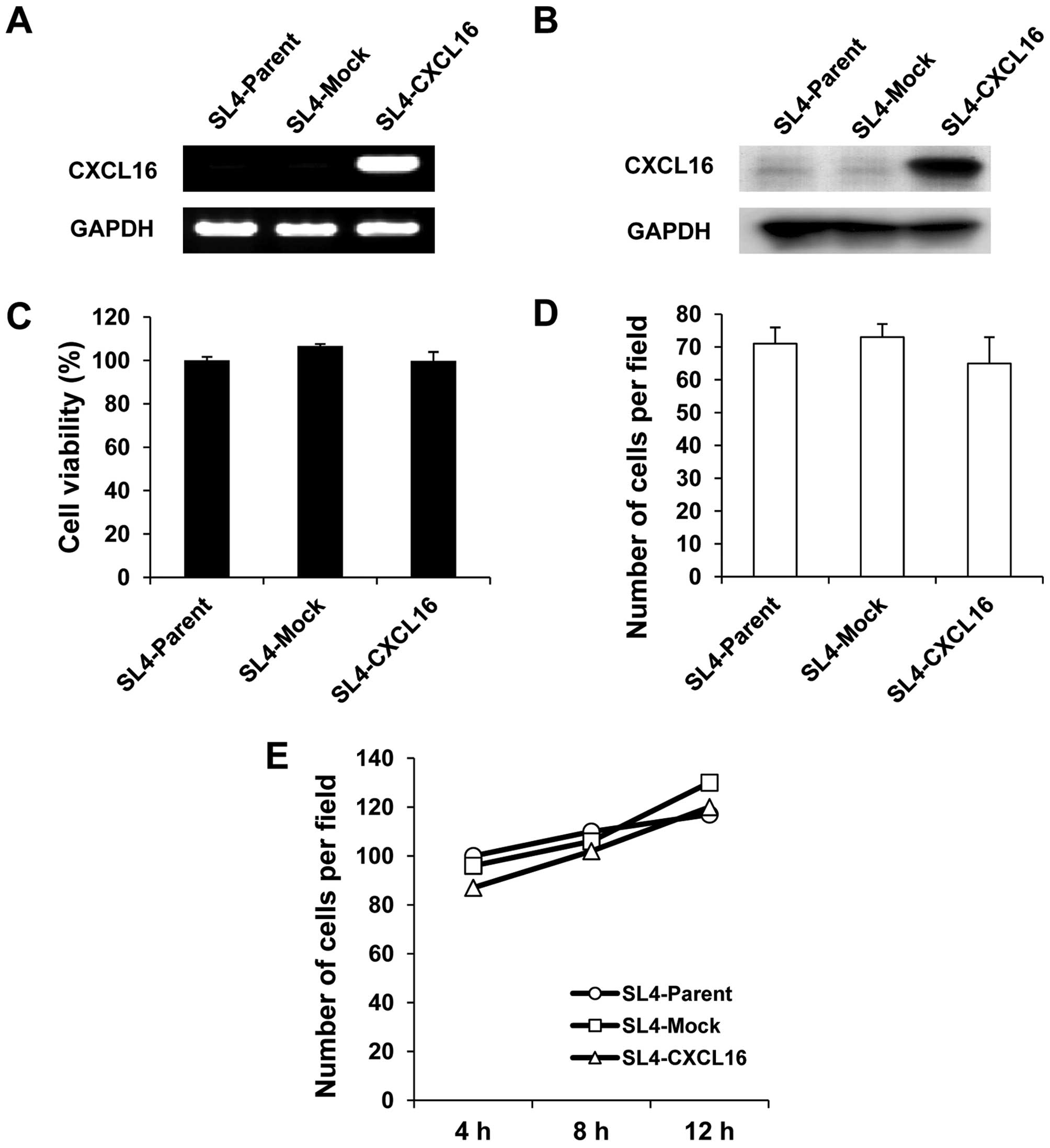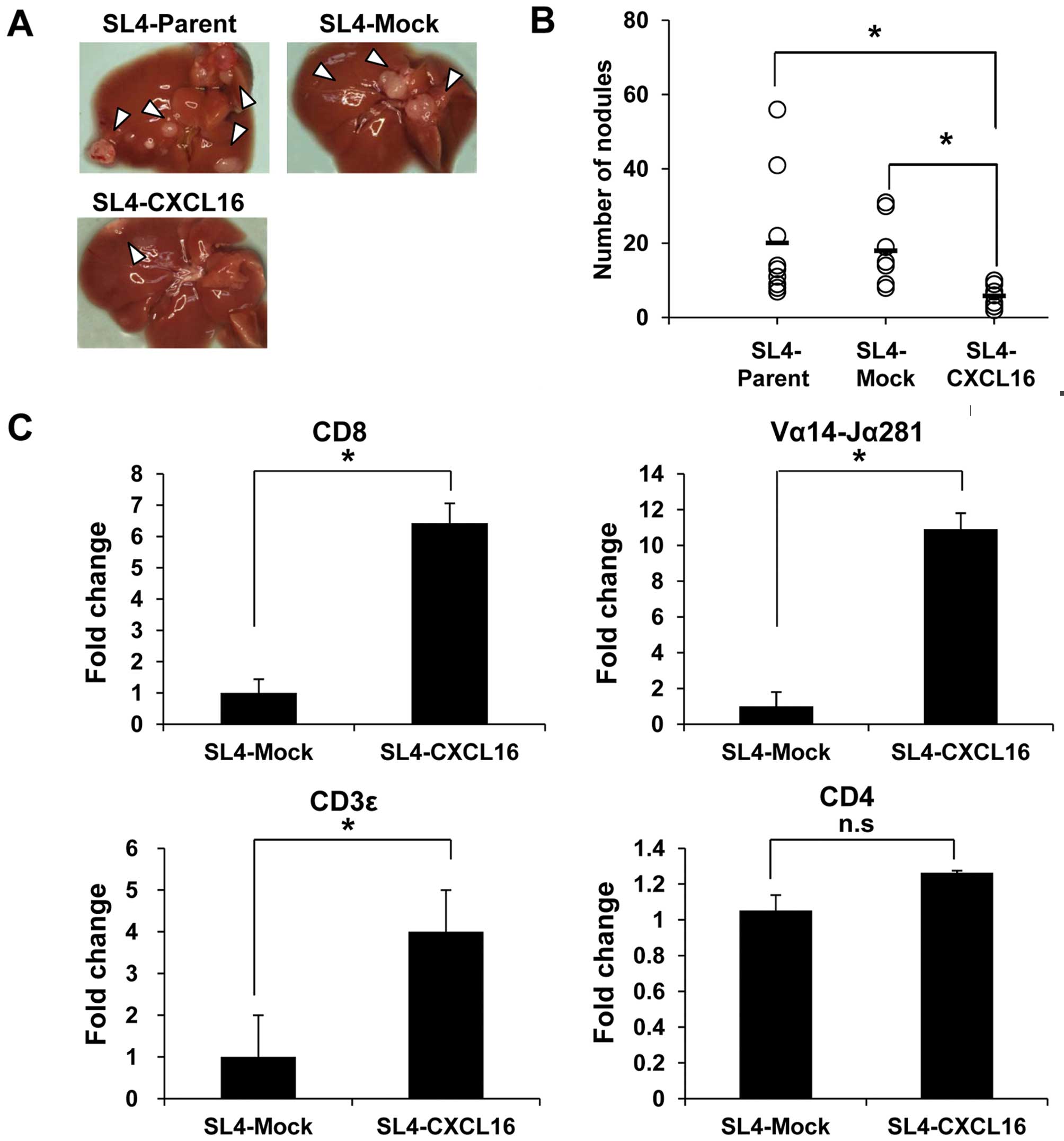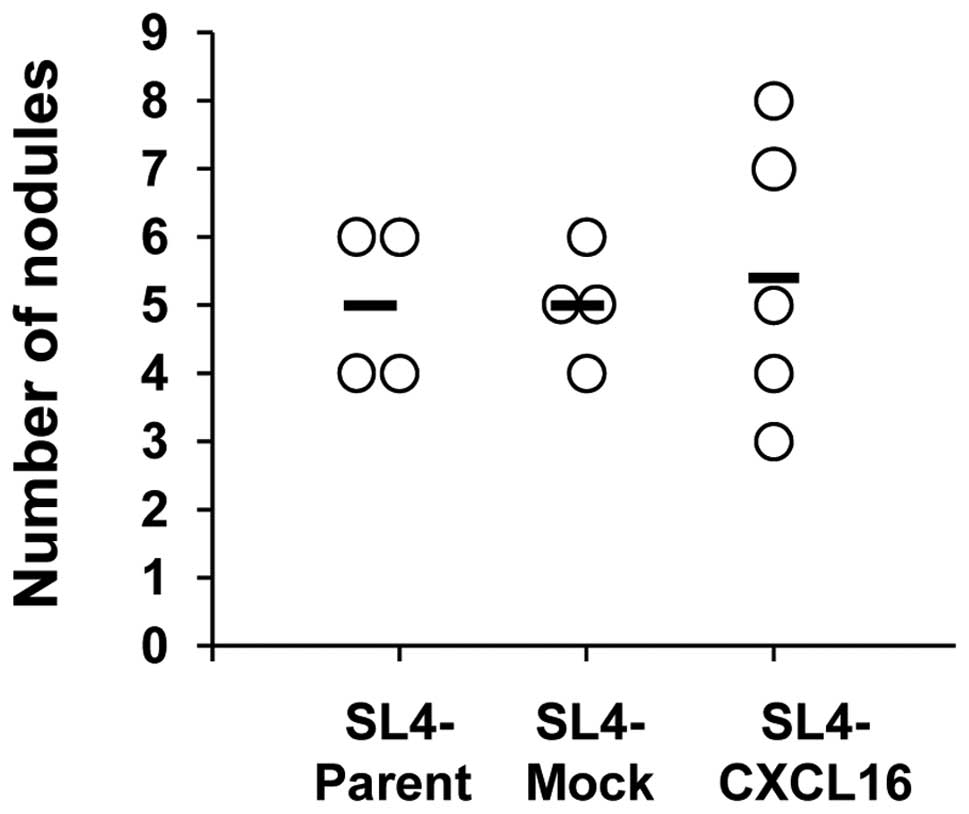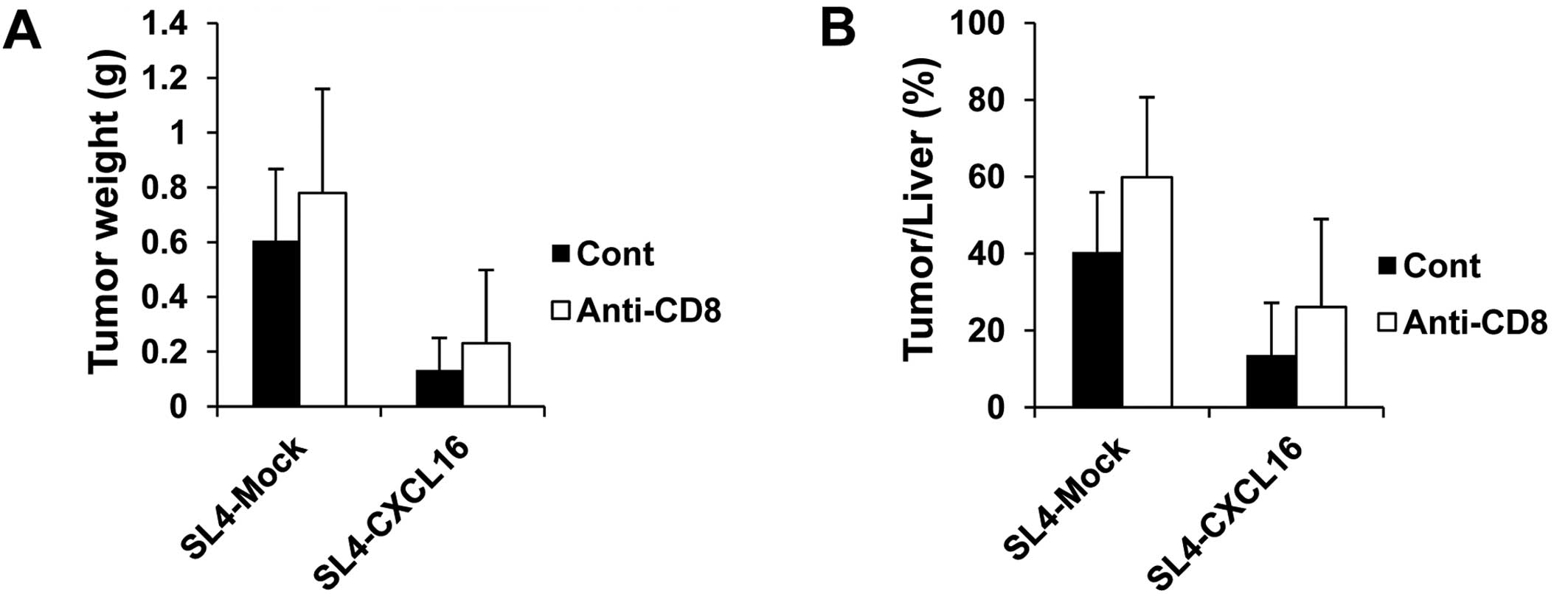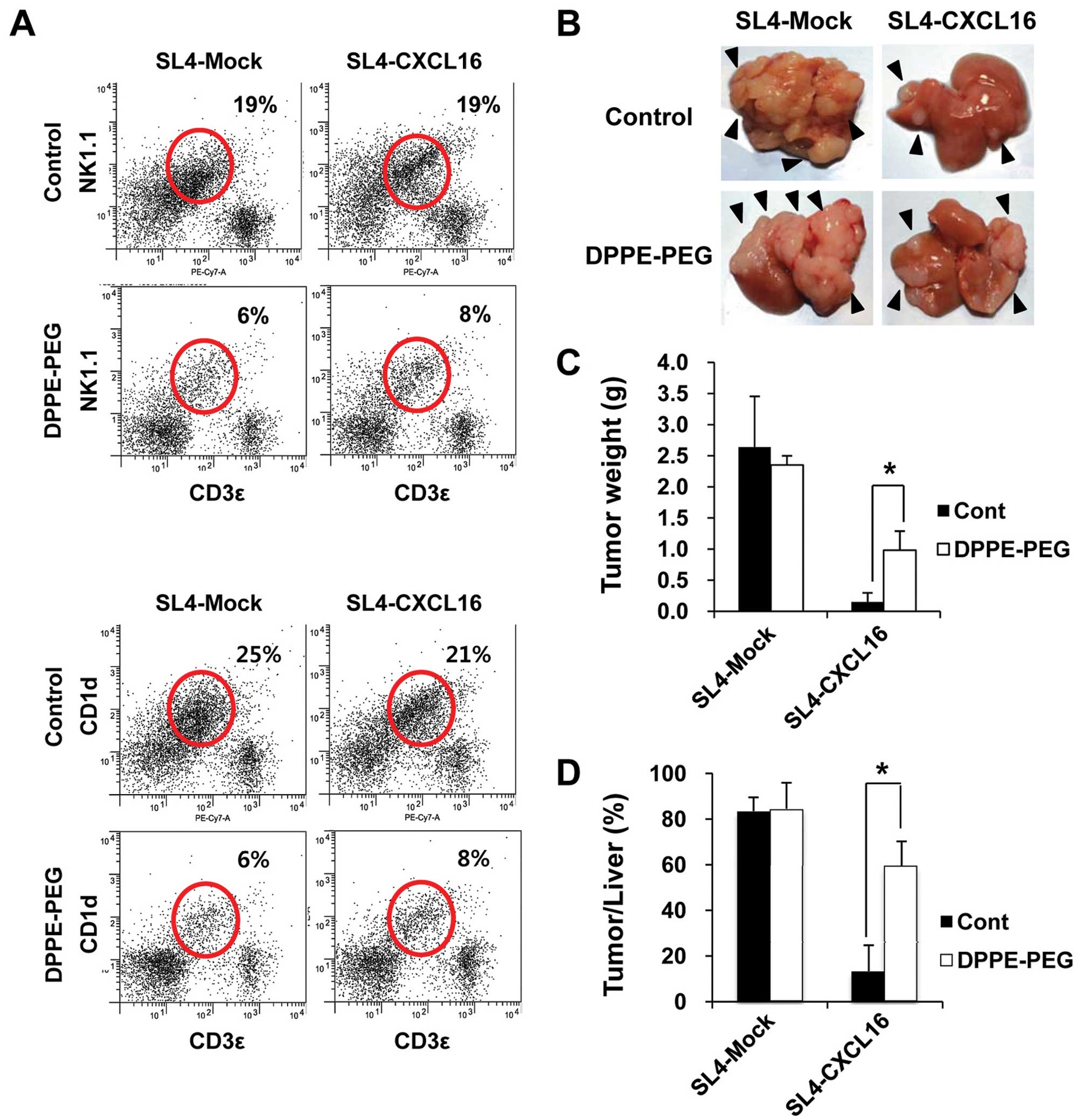|
1
|
Jemal A, Bray F, Center MM, Ferlay J, Ward
E and Forman D: Global cancer statistics. CA Cancer J Clin.
61:69–90. 2011. View Article : Google Scholar
|
|
2
|
Timmerman RD, Bizekis CS, Pass HI, Fong Y,
Dupuy DE, Dawson LA and Lu D: Local surgical, ablative, and
radiation treatment of metastases. CA Cancer J Clin. 59:145–170.
2009. View Article : Google Scholar : PubMed/NCBI
|
|
3
|
Zlotnik A, Burkhardt AM and Homey B:
Homeostatic chemokine receptors and organ-specific metastasis. Nat
Rev Immunol. 11:597–606. 2011. View
Article : Google Scholar : PubMed/NCBI
|
|
4
|
Koizumi K, Hojo S, Akashi T, Yasumoto K
and Saiki I: Chemokine receptors in cancer metastasis and cancer
cell-derived chemokines in host immune response. Cancer Sci.
98:1652–1658. 2007. View Article : Google Scholar : PubMed/NCBI
|
|
5
|
Koizumi K, Kato S, Sakurai H, Hashimoto I,
Yasumoto K and Saiki I: Therapeutics target of CXCR4 and its
downstream in peritoneal carcinomatosis of gastric cancer. Front
Biosci (Schol Ed). 4:269–276. 2012. View
Article : Google Scholar : PubMed/NCBI
|
|
6
|
Matloubian M, David A, Engel S, Ryan JE
and Cyster JG: A transmembrane CXC chemokine is a ligand for HIV
coreceptor Bonzo. Nat Immunol. 1:298–304. 2000. View Article : Google Scholar : PubMed/NCBI
|
|
7
|
Shimaoka T, Kume N, Minami M, Hayashida K,
Kataoka H, Kita T and Yonehara S: Molecular cloning of a novel
scavenger receptor for oxidized low density lipoprotein, SR-PSOX,
on macrophages. J Biol Chem. 275:40663–40666. 2000. View Article : Google Scholar : PubMed/NCBI
|
|
8
|
Wilbanks A, Zondlo SC, Murphy K, Mak S,
Soler D, Langdon P, Andrew DP, Wu L and Briskin M: Expression
cloning of the STRL33/BONZO/TYMSTR ligand reveals elements of CC,
CXC, and CX3C chemokines. J Immunol. 166:5145–5154. 2001.
View Article : Google Scholar : PubMed/NCBI
|
|
9
|
Abel S, Hundhausen C, Mentlein R, Schulte
A, Berkhout TA, Broadway N, Hartmann D, Sedlacek R, Dietrich S,
Muetze B, Schuster B, Kallen KJ, Saftig P, Rose-John S and Ludwig
A: The transmembrane CXC-chemokine ligand 16 is induced by
IFN-gamma and TNF-alpha and shed by the activity of the
disintegrin-like metalloproteinase ADAM10. J Immunol.
172:6362–6372. 2004. View Article : Google Scholar : PubMed/NCBI
|
|
10
|
Gough PJ, Garton KJ, Wille PT, Rychlewski
M, Dempsey PJ and Raines EW: A disintegrin and metalloproteinase
10-mediated cleavage and shedding regulates the cell surface
expression of CXC chemokine ligand 16. J Immunol. 172:3678–3685.
2004. View Article : Google Scholar : PubMed/NCBI
|
|
11
|
Ludwig A, Hundhausen C, Lambert MH,
Broadway N, Andrews RC, Bickett DM, Leesnitzer MA and Becherer JD:
Metalloproteinase inhibitors for the disintegrin-like
metalloproteinases ADAM10 and ADAM17 that differentially block
constitutive and phorbol ester-inducible shedding of cell surface
molecules. Comb Chem High Throughput Screen. 8:161–171. 2005.
View Article : Google Scholar
|
|
12
|
Gutwein P, Schramme A, Sinke N,
Abdel-Bakky MS, Voss B, Obermuller N, Doberstein K, Koziolek M,
Fritzsche F, Johannsen M, Jung K, Schaider H, Altevogt P, Ludwig A,
Pfeilschifter J and Kristiansen G: Tumoural CXCL16 expression is a
novel prognostic marker of longer survival times in renal cell
cancer patients. Eur J Cancer. 10:1016–1023. 2008.PubMed/NCBI
|
|
13
|
Lu Y, Wang J, Xu Y, Koch AE, Cai Z, Chen
X, Galson DL, Taichman RS and Zhang J: CXCL16 functions as a novel
chemotactic factor for prostate cancer cells in vitro. Mol Cancer
Res. 6:546–554. 2008. View Article : Google Scholar : PubMed/NCBI
|
|
14
|
Darash-Yahana M, Gillespie JW, Hewitt SM,
Chen YY, Maeda S, Stein I, Singh SP, Bedolla RB, Peled A, Troyer
DA, Pikarsky E, Karin M and Farber JM: The chemokine CXCL16 and its
receptor, CXCR6, as markers and promoters of
inflammation-associated cancers. Plos One. 4:e66952009. View Article : Google Scholar : PubMed/NCBI
|
|
15
|
Hojo S, Koizumi K, Tsuneyama K, Arita Y,
Cui Z, Shinohara K, Minami T, Hashimoto I, Nakayama T, Sakurai H,
Takano Y, Yoshie O, Tsukada K and Saiki I: High-level expression of
chemokine CXCL16 by tumor cells correlates with a good prognosis
and increased tumor-infiltrating lymphocytes in colorectal cancer.
Cancer Res. 67:4725–4731. 2007. View Article : Google Scholar : PubMed/NCBI
|
|
16
|
Wågsäter D, Hugander A and Dimberg J:
Expression of CXCL16 in human rectal cancer. Int J Mol Med.
14:65–69. 2004.
|
|
17
|
Wente MN, Gaida MM, Mayer C, Michalski CW,
Haag N, Giese T, Felix K, Bergmann F, Giese NA and Friess H:
Expression and potential function of the CXC chemokine CXCL16 in
pancreatic ductal adenocarcinoma. Int J Oncol. 33:297–308.
2008.PubMed/NCBI
|
|
18
|
Ou DL, Chen CL, Lin SB, Hsu CH and Lin LI:
Chemokine receptor expression profiles in nasopharyngeal carcinoma
and their association with metastasis and radiotherapy. J Pathol.
210:363–373. 2006. View Article : Google Scholar : PubMed/NCBI
|
|
19
|
Held-Feindt J, Rehmke B, Mentlein R,
Hattermann K, Knerlich F, Hugo HH, Ludwig A and Mehdorn HM:
Overexpression of CXCL16 and its receptor CXCR6/Bonzo promotes
growth of human schwannomas. Glia. 56:764–774. 2008. View Article : Google Scholar : PubMed/NCBI
|
|
20
|
Seidl H, Richtig E, Tilz H, Stefan M,
Schmidbauer U, Asslaber M, Zatloukal K, Herlyn M and Schaider H:
Profiles of chemokine receptors in melanocytic lesions: de novo
expression of CXCR6 in melanoma. Human Pathol. 38:768–780. 2007.
View Article : Google Scholar : PubMed/NCBI
|
|
21
|
Kim CH, Kunkel EJ, Boisvert J, Johnston B,
Campbell JJ, Genovese MC, Greenberg HB and Butcher EC: Bonzo/CXCR6
expression defines type 1-polarized T-cell subsets with
extralymphoid tissue homing potential. J Clin Invest. 107:595–601.
2001. View
Article : Google Scholar : PubMed/NCBI
|
|
22
|
Kim CH, Johnston B and Butcher EC:
Trafficking machinery of NKT cells: shared and differential
chemokine receptor expression among V alpha 24(+)V beta 11(+) NKT
cell subsets with distinct cytokine-producing capacity. Blood.
100:11–16. 2002.PubMed/NCBI
|
|
23
|
Taniguchi M, Harada M, Kojo S, Nakayama T
and Wakao H: The regulatory role of Valpha14 NKT cells in innate
and acquired immune response. Annu Rev Immunol. 21:483–513. 2003.
View Article : Google Scholar : PubMed/NCBI
|
|
24
|
Cui J, Shin T, Kawano T, Sato H, Kondo E,
Toura I, Kaneko Y, Koseki H, Kanno M and Taniguchi M: Requirement
for Valpha14 NKT cells in IL-12-mediated rejection of tumors.
Science. 278:1623–1626. 1997. View Article : Google Scholar : PubMed/NCBI
|
|
25
|
Kawano T, Cui J, Koezuka Y, Toura I,
Kaneko Y, Sato H, Kondo E, Harada M, Koseki H, Nakayama T, Tanaka Y
and Taniguchi M: Natural killer-like nonspecific tumor cell lysis
mediated by specific ligand-activated Valpha14 NKT cells. Proc Natl
Acad Sci USA. 95:5690–5693. 1998. View Article : Google Scholar : PubMed/NCBI
|
|
26
|
Toura I, Kawano T, Akutsu Y, Nakayama T,
Ochiai T and Taniguchi M: Cutting edge: inhibition of experimental
tumor metastasis by dendritic cells pulsed with
alpha-galactosylceramide. J Immunol. 163:2387–2391. 1999.PubMed/NCBI
|
|
27
|
Smyth MJ, Thia KY, Street SE, Cretney E,
Trapani JA, Taniguchi M, Kawano T, Pelikan SB, Crowe NY and Godfrey
DI: Differential tumor surveillance by natural killer (NK) and NKT
cells. J Exp Med. 191:661–668. 2000. View Article : Google Scholar : PubMed/NCBI
|
|
28
|
Cullen R, Germanov E, Shimaoka T and
Johnston B: Enhanced tumor metastasis in response to blockade of
the chemokine receptor CXCR6 is overcome by NKT cell activation. J
Immunol. 183:5807–5815. 2009. View Article : Google Scholar : PubMed/NCBI
|
|
29
|
Nakagawa R, Nagafune I, Tazunoki Y, Ehara
H, Tomura H, Iijima R, Motoki K, Kamishohara M and Seki S:
Mechanisms of the antimetastatic effect in the liver and of the
hepatocyte injury induced by alpha-galactosylceramide in mice. J
Immunol. 166:6578–6584. 2001. View Article : Google Scholar : PubMed/NCBI
|
|
30
|
Smyth MJ, Crowe NY, Pellicci DG,
Kyparissoudis K, Kelly JM, Takeda K, Yagita H and Godfrey DI:
Sequential production of interferon-gamma by NK1.1(+) T cells and
natural killer cells is essential for the antimetastatic effect of
alpha-galactosylceramide. Blood. 99:1259–1266. 2002.
|
|
31
|
Tachibana T, Onodera H, Tsuruyama T, Mori
A, Nagayama S, Hiai H and Imamura M: Increased intratumor
Valpha24-positive natural killer T cells: a prognostic factor for
primary colorectal carcinomas. Clin Cancer Res. 11:7322–7327. 2005.
View Article : Google Scholar
|
|
32
|
Thomas SY, Hou R, Boyson JE, Means TK,
Hess C, Olson DP, Strominger JL, Brenner MB, Gumperz JE, Wilson SB
and Luster AD: CD1d-restricted NKT cells express a chemokine
receptor profile indicative of Th1-type inflammatory homing cells.
J Immunol. 171:2571–2580. 2003. View Article : Google Scholar : PubMed/NCBI
|
|
33
|
Johnston B, Kim CH, Soler D, Emoto M and
Butcher EC: Differential chemokine responses and homing patterns of
murine TCR alpha beta NKT cell subsets. J Immunol. 171:2960–2969.
2003. View Article : Google Scholar : PubMed/NCBI
|
|
34
|
Geissmann F, Cameron TO, Sidobre S,
Manlongat N, Kronenberg M, Briskin MJ, Dustin ML and Littman DR:
Intravascular immune surveillance by CXCR6+ NKT cells
patrolling liver sinusoids. PLoS Biol. 3:e1132005. View Article : Google Scholar : PubMed/NCBI
|
|
35
|
Germanov E, Veinotte L, Cullen R,
Chamberlain E, Butcher EC and Johnston B: Critical role for the
chemokine receptor CXCR6 in homeostasis and activation of
CD1d-restricted NKT cells. J Immunol. 181:81–91. 2008. View Article : Google Scholar : PubMed/NCBI
|
|
36
|
Ha HK, Lee W, Park HJ, Lee SD, Lee JZ and
Chung MK: Clinical significance of CXCL16/CXCR6 expression in
patients with prostate cancer. Mol Med Rep. 4:419–424.
2011.PubMed/NCBI
|
|
37
|
Guo L, Cui ZM, Zhang J and Huang Y:
Chemokine axes CXCL12/CXCR4 and CXCL16/CXCR6 correlate with lymph
node metastasis in epithelial ovarian carcinoma. Chin J Cancer.
30:336–343. 2011. View Article : Google Scholar : PubMed/NCBI
|
|
38
|
Lombardi V, Stock P, Singh AK, Kerzerho J,
Yang W, Sullivan BA, Li X, Shiratsuchi T, Hnatiuk NE, Howell AR, Yu
KO, Porcelli SA, Tsuji M, Kronenberg M, Wilson SB and Akbari O: A
CD1d-dependent antagonist inhibits the activation of invariant NKT
cells and prevents development of allergen-induced airway
hyperreactivity. J Immunol. 184:2107–2115. 2010. View Article : Google Scholar : PubMed/NCBI
|
|
39
|
Sato T, Thorlacius H, Johnston B, Staton
TL, Xiang W, Littman DR and Butcher EC: Role for CXCR6 in
recruitment of activated CD8+ lymphocytes to inflamed
liver. J Immunol. 174:277–283. 2005. View Article : Google Scholar : PubMed/NCBI
|
|
40
|
Heydtmann M, Lalor PF, Eksteen JA,
Hubscher SG, Briskin M and Adams DH: CXC chemokine ligand 16
promotes integrin-mediated adhesion of liver-infiltrating
lymphocytes to cholangiocytes and hepatocytes within the inflamed
human liver. J Immunol. 174:1055–1062. 2005. View Article : Google Scholar
|
|
41
|
Wang RF: CD8+ regulatory T
cells, their suppressive mechanisms, and regulation in cancer. Hum
Immunol. 69:811–814. 2008.
|
|
42
|
Slettenaar VI and Wilson JL: The chemokine
network: a target in cancer biology? Adv Drug Deliv Rev.
58:962–974. 2006. View Article : Google Scholar : PubMed/NCBI
|















